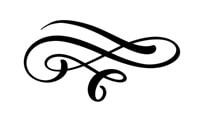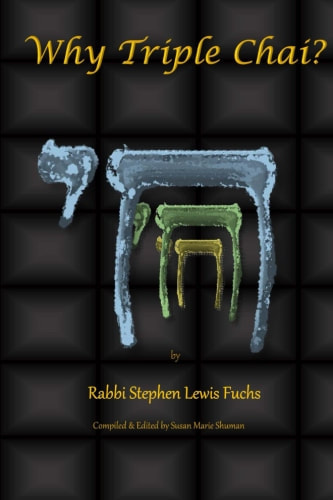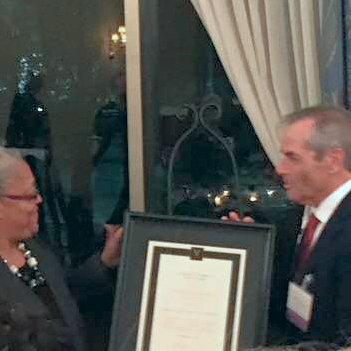Recently, when a friend accepted a job with a Jewish Federation, she asked if there is anything I thought she needed to know.
Jokingly, I responded, “You might want to brush up on your 18-multiplication table.” She understood.
In Jewish life, eighteen is an integral number. It stands for the Hebrew word, “Chai” (חי) which means, “LIFE.”
Each of the Hebrew letters has a numerical value. The first letter, “Aleph,” (א) is “one,” the second, “Bet,” (ב) is “two” and so on.
The word, “Chai,” (חי) consists of the letter, “Het,” (ח) which is “eight,” and the letter,” Yod,” (י), which is, “ten.” So, the letters that form the word for “Life” in Hebrew amount to eighteen.
For that reason, it is customary for Jews to offer $18.00 as a donation, instead of $15.00 or $20.00 We also give in multiples of Chai, say $54.00 (3 x Chai) instead of $50.00 or $1080.00 (60 x Chai) instead of $1,000.00.
In writing Three Times Chai I wanted exactly fifty-four chapters because in Jewish tradition multiples of Chai have special significance. In terms of my own life, I have eased past three x chai. In fact, I shall, God willing, reach four times Chai in March 2018. I do not take that milestone for granted because if I reach it I shall have lived longer than my father and both grandfathers.
As a survivor of two open-heart surgeries in 1996 and 2012 for a congenital disorder and a life-threatening strep infection in 2017, I do not take a single day for granted. Every day a gift. My life has taught me the meaning of the Psalmist’s words:
“Teach us to number our days, that we may get a heart of wisdom.” (Psalm 90:12).
My Covenant with God calls on me to try to fill each day with meaning. I cannot control how long I will live, but I can control how I spend my days.
Surely, I hope to reach four times Chai, and when I do I shall look toward five times Chai and beyond. But tomorrow is guaranteed to none of us.
My way of trying to make each day count is to share my thoughts and ideas on the meaning of life. I hope you find them worthwhile.
Stephen Lewis Fuchs
West Hartford, Connecticut
Erev Rosh Hashanah 5778
Jokingly, I responded, “You might want to brush up on your 18-multiplication table.” She understood.
In Jewish life, eighteen is an integral number. It stands for the Hebrew word, “Chai” (חי) which means, “LIFE.”
Each of the Hebrew letters has a numerical value. The first letter, “Aleph,” (א) is “one,” the second, “Bet,” (ב) is “two” and so on.
The word, “Chai,” (חי) consists of the letter, “Het,” (ח) which is “eight,” and the letter,” Yod,” (י), which is, “ten.” So, the letters that form the word for “Life” in Hebrew amount to eighteen.
For that reason, it is customary for Jews to offer $18.00 as a donation, instead of $15.00 or $20.00 We also give in multiples of Chai, say $54.00 (3 x Chai) instead of $50.00 or $1080.00 (60 x Chai) instead of $1,000.00.
In writing Three Times Chai I wanted exactly fifty-four chapters because in Jewish tradition multiples of Chai have special significance. In terms of my own life, I have eased past three x chai. In fact, I shall, God willing, reach four times Chai in March 2018. I do not take that milestone for granted because if I reach it I shall have lived longer than my father and both grandfathers.
As a survivor of two open-heart surgeries in 1996 and 2012 for a congenital disorder and a life-threatening strep infection in 2017, I do not take a single day for granted. Every day a gift. My life has taught me the meaning of the Psalmist’s words:
“Teach us to number our days, that we may get a heart of wisdom.” (Psalm 90:12).
My Covenant with God calls on me to try to fill each day with meaning. I cannot control how long I will live, but I can control how I spend my days.
Surely, I hope to reach four times Chai, and when I do I shall look toward five times Chai and beyond. But tomorrow is guaranteed to none of us.
My way of trying to make each day count is to share my thoughts and ideas on the meaning of life. I hope you find them worthwhile.
Stephen Lewis Fuchs
West Hartford, Connecticut
Erev Rosh Hashanah 5778
A Night to Remember
Sanibel Rabbi Receives 'Rare Honor' From Vanderbilt
Birmingham, AL, October 18, 2017– Last night, Rabbi Stephen Lewis Fuchs was officially named Distinguished Alumnus of 2017 by Vanderbilt Divinity School in Nashville, TN. Rabbi Fuchs, DMin’92, is the first Jew in the history of VDS to receive this award.
To be considered for the Distinguished Alumnus Award, one must demonstrate excellence and distinction in justice-making through their work in congregational ministry, religious institutions, ecumenical organizations, community–based organizations, government or other social institutions.
“I am humbled and proud that Vanderbilt Divinity School has recognized me in this way, particularly since I have learned that it is rare for a Christian Divinity School to recognize a Jew in this fashion.”
Rabbi Stephen Fuchs assumed the pulpit at Bat Yam Temple of the Islands in September. He is also rabbi emeritus at Congregation Beth Israel, has been a strong advocate for universal health care, playing a significant role in the passage of legislation for access to quality, affordable health care in Connecticut. He is a former president of the World Union for Progressive Judaism. During his extensive travels, Fuchs and his wife, Victoria, have visited many churches and schools in Germany to help educate young people about the significance of the Holocaust. His overarching message to the German students is this:
“Wir können die Vergangenheit nicht ungeschehen machen ...”
“We cannot undue the past, but the future is ours to shape.”
The rabbi is the author of four books: The first book, What’s in It for Me? Finding Ourselves in Biblical Narratives, is based on his Vanderbilt doctoral dissertation and has been translated into German, Russian and Spanish. Additional publications include ToraHighlights; Why the Kof? Getting the Best of Rabbi Fuchs, a collection of his essays and blog posts, and Why Triple Chai?
The award dinner and ceremony was held on Tuesday, October 17 at the University Club of Nashville.
To be considered for the Distinguished Alumnus Award, one must demonstrate excellence and distinction in justice-making through their work in congregational ministry, religious institutions, ecumenical organizations, community–based organizations, government or other social institutions.
“I am humbled and proud that Vanderbilt Divinity School has recognized me in this way, particularly since I have learned that it is rare for a Christian Divinity School to recognize a Jew in this fashion.”
Rabbi Stephen Fuchs assumed the pulpit at Bat Yam Temple of the Islands in September. He is also rabbi emeritus at Congregation Beth Israel, has been a strong advocate for universal health care, playing a significant role in the passage of legislation for access to quality, affordable health care in Connecticut. He is a former president of the World Union for Progressive Judaism. During his extensive travels, Fuchs and his wife, Victoria, have visited many churches and schools in Germany to help educate young people about the significance of the Holocaust. His overarching message to the German students is this:
“Wir können die Vergangenheit nicht ungeschehen machen ...”
“We cannot undue the past, but the future is ours to shape.”
The rabbi is the author of four books: The first book, What’s in It for Me? Finding Ourselves in Biblical Narratives, is based on his Vanderbilt doctoral dissertation and has been translated into German, Russian and Spanish. Additional publications include ToraHighlights; Why the Kof? Getting the Best of Rabbi Fuchs, a collection of his essays and blog posts, and Why Triple Chai?
The award dinner and ceremony was held on Tuesday, October 17 at the University Club of Nashville.
Repeatedly in the Bible, it is the woman who 'gets it' and the man who is clueless. Eve has been maligned for generations for the supposed fall of man, when in fact; she is the heroine of the elevation of humanity. ~
"Women (Em)Power" from "Why the Kof? Getting the Best of Rabbi Fuchs."
"Women (Em)Power" from "Why the Kof? Getting the Best of Rabbi Fuchs."
Site powered by Weebly. Managed by iPage






